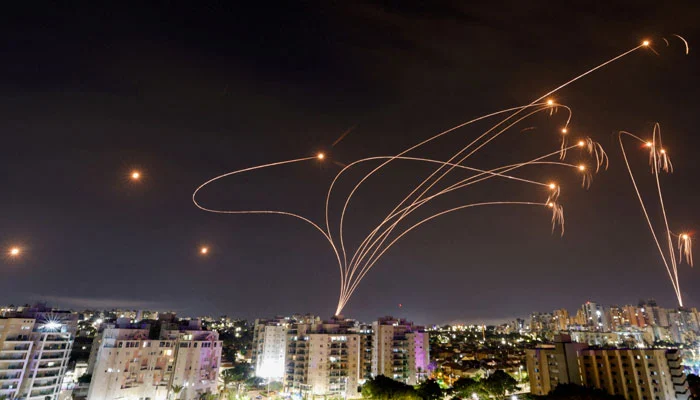Power Plant Shutdown Heightens Humanitarian Concerns:
The sole power plant in Gaza ceased operations due to a fuel shortage, a consequence of an Israeli embargo following an attack by Hamas on Israeli cities. Officials within Gaza have expressed fears of an impending humanitarian crisis as the power plant grinds to a halt due to the lack of fuel.
Israel’s Military Response to Hamas Attack:

In response to Hamas’s surprise attack, Israeli Defense Minister Yoav Gallant pledged to initiate a ground offensive. This escalatory move has raised concerns about the consequences of this ongoing conflict.
Fuel Shortage Spells Darkness for Gaza Strip:
The complete blockade enforced by Israeli authorities on the besieged Gaza Strip has caused fuel shortages, which could plunge the territory into darkness within hours. The lack of electricity affects essential services, further intensifying the crisis for Gaza’s residents.
Accusations of White Phosphorus Use:
Amid the conflict, Palestine accused Israel of deploying internationally banned white phosphorus bombs in the Gaza Strip’s Karama neighborhood. These allegations have prompted international concern.
Witness Reports of White Phosphorus Use:
Rami Abdo, the founder of the European Observatory for Human Rights, shared a video on social media that purportedly shows the use of phosphorus bombs by Israeli military forces. The potential use of such munitions has sparked controversy.
Legal and Humanitarian Implications of White Phosphorus Use:
The 1980 Geneva Convention prohibits the use of white phosphorus in densely populated areas, although it is legally accepted for creating smokescreens and concealing troop movements. These allegations raise questions about the conflict’s compliance with international humanitarian law.
Israeli Military Strikes and Civilian Casualties:
Israeli military forces conducted numerous airstrikes, targeting over 200 locations in a Gaza City neighborhood reportedly used by Hamas to launch attacks. The ongoing conflict has resulted in a significant number of casualties, with hundreds killed and thousands wounded in the densely populated coastal enclave.
Hamas Attack on Southern Israel:
Hamas gunmen from the Gaza Strip carried out a violent attack in southern Israel, marked as one of the deadliest Palestinian assaults in Israel’s history. The attack left a high death toll, with many of the victims being civilians. Some captured individuals were paraded through the streets on social media.
Root Causes of the Conflict:
Hamas claimed the attack was in response to Israeli provocations in the Al-Aqsa Mosque complex in East Jerusalem and increasing settler violence.
Humanitarian Concerns:
An official statement by the Government Media Office in Gaza warned of an imminent humanitarian catastrophe. The power plant’s shutdown due to fuel depletion poses a dire threat to basic life services that rely on electricity, especially with restrictions on fuel supplies.
International Reactions:
United Nations Secretary-General Antonio Guterres emphasized the dire humanitarian situation in Gaza and warned that it would deteriorate further due to the conflict. Human Rights Watch criticized Israel’s implementation of a complete siege, describing it as a form of collective punishment and a potential war crime.
Food Supply and Living Conditions:
The World Food Programme reported concerns about food stocks rapidly depleting due to the fear of a prolonged conflict, exacerbated by recurrent electricity cuts. This situation has severely affected daily life for Gaza’s residents.
Displacement Crisis:
Over 260,000 people have been forced to flee their homes in the Gaza Strip due to heavy Israeli bombardments from the air, land, and sea. Many housing units have been destroyed or rendered uninhabitable.
Israel’s Siege on Gaza:
Israel has imposed a total siege on the already blockaded Gaza Strip, severely limiting access to food, water, fuel, and electricity. UN Secretary-General Antonio Guterres warned that this siege worsens the already dire humanitarian situation.
Further Escalations and International Concern:
The conflict has not been confined to Gaza, with a multi-front war looming as clashes erupted on Israel’s northern border with Lebanon. For the first time since the Hamas attack, there was an exchange of fire between Israel and forces in Syria. International concern has grown as citizens from various countries have been killed, abducted, or reported missing.
A Challenging Situation for Gazans:
Fear and chaos have gripped the 2.3 million Palestinians living in the coastal territory, which has endured numerous Israeli munitions.
International Diplomatic Calls:
With tensions escalating, the international community is calling for urgent diplomatic efforts to halt the crisis and provide essential aid to Gaza. Prime Minister Netanyahu of Israel has proposed an “emergency government of national unity” as the nation grapples with the ongoing conflict.